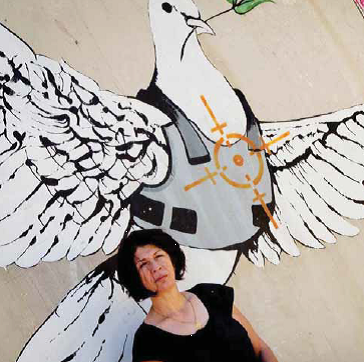Mastermind of murder of 22 Israeli school children and 4 adults idolized by the official Palestinian Authority daily
Note: PMW reported on the construction of the monument to Khaled Nazzal. It was destroyed by Israeli security forces and rebuilt by Palestinians multiple times.
Headline: "The sister of Martyr Nazzal: He exists in his family and people's memory!"
"On June 9, 1986, a handsome young man stood at the door of the Sheraton Hotel in Athens, but as fate would have it he never reached his destination after he was shot at. He was wounded by four bullets that shattered his head, and fell to the ground wallowing in his blood.
There is no doubt that the young man, who came from Damascus, was registered at the hotel under a false name and had taken precautions so that his real identity would not be discovered: Khaled Nazzal (i.e., terrorist, responsible for murder of at least 31), the one responsible for the military activity of the Democratic Front for the Liberation of Palestine (DFLP) in the occupied territories.
After all these long years, the details of the assassination are still unclear to Dr. Rihab Nazzal, Khaled's sister…
Khaled's comrades in the DFLP describe their comrade as 'the Lion of Palestine'… He commanded a number of battles and skirmishes in southern Lebanon, and participated in battles that took place during the invasion of Lebanon in 1982 (i.e., the First Lebanon War). He is credited with the responsibility for a number of excellent self-sacrificing operations (i.e., terror attacks) in the occupied territories…
Rihab recalls: 'My real meeting with Khaled was when I finished my high school studies and received a scholarship from Damascus University in 1980. There I met an idealistic man, who believed in the principles of equality and justice – in speech and action – and more importantly, believed strongly in the justice of our cause, and to give often without limits or compensation. The only compensation he aspired to receive was the freedom of the homeland and the future generations.'
…
Rihab sees her brother and his moral values as ideals that were not detached from his progressive ideas: 'He treated his beautiful wife Rima, his lively daughter Dima, and afterwards his son Ghaith in an ideal and humane manner, full of love, appreciation, and concern… We became friends more than siblings. I would read his eyes; his eyes spoke, expressed the situation of the homeland. The achievements or failures were reflected wordlessly in his eyes.'
…
She added: 'He knew that he was in [Israel's] sights, and knew that their forces could reach him wherever he might be. Despite this, he refused bodyguards and refused to have a private driver.'
The occupation did not forget Khaled Nazzal, even after his assassination. In June 2017, the Jenin Municipality erected a monument to Martyr Nazzal on Haifa Road in the city, and called the monument's square 'Martyr Khaled Nazzal Square.' The occupation ordered to remove the monument, and threatened to invade the city. Occupation forces invaded the city in order to remove the monument, but the Palestinians rebuilt it in defiance of the occupation."
 The article is accompanied by a picture showing Khaled Nazzal's sister Rihab Nazzal under graffiti of a dove with an olive branch in its beak wearing a bulletproof vest, and gun sights over its heart.
The article is accompanied by a picture showing Khaled Nazzal's sister Rihab Nazzal under graffiti of a dove with an olive branch in its beak wearing a bulletproof vest, and gun sights over its heart.